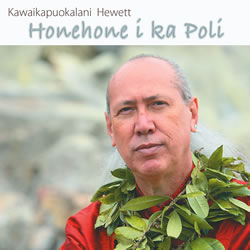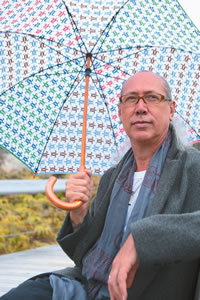Frank Kawaikapuokalani Hewett
The 411

Two of Frank Kawaikapuokalani Hewett’s loves - family and music - meet in his recently released album, Honehone i ka Poli, as his daughter Ula accompanies him on vocals.
“I had several kinds of focuses with this album, one that I really wanted to record with my daughter because I really feel she has a beautiful voice,“says Hewett.“I wanted to have the opportunity to do a CD and have her on it with me. I actually wanted to do that for a long time.
“The other thing is that I have just come to that realization where I feel comfortable with myself and the music that I write. Nothing else makes me happier now, knowing that I have raised all my children. Now I get to see my grandchildren, and I’m just happy knowing that I am what I am and nothing more than that.”
True to Hewett’s signature style, the album is all original music that Hewett says is a true reflection of who he is right now. Instead of focusing on making everyone else happy, he has slowly come to realize that happiness begins and ends with him - and his music is an avenue for him to share that.
“Right now it’s just being happy for myself,” he says. “Good or bad, I came to realize that ... the music I’m writing now reflects a different me.”
The songs are in traditional Hawaiian hula style, infused with elements of classical, pop and contemporary jazz. Adding instrumental touches on piano, slack key guitar, ukulele and bass is Daniel Ho,who also worked with Hewett in producing the album.
“He is a fascinating individual, an icon as a kumu hula both in Hawaii and in Japan,” says Ho.
As kumu hula, Hewett has taken the responsibility to perpetuate the art form seriously. He has spent the past 35 years as the kumu of Kuhai Halau O Kawaikapuokalani Pa ‘Olapa Kahiko, and has more recently stretched his mana’o (knowledge) throughout the world.
“What traveling allows me to do is to write about all these different countries I visit,“says Hewett.“When our ancestors traveled, they used to write about the places that they went to. I really want to do that too.”
Now, at 55 years old, Hewett says he’s at a place where he can really concentrate on just hula and music.
“My hula and my music are now at the forefront,“says Hewett.“Before I had all these different things, and they were excellent because it was a good learning tool. Now my concentration is on my music and on my hula, and I want to build on that.”
Coming up is another all-original album on his experiences in Japan and the beauty seen there. Recording is planned within the next couple months, and the release is projected early next year.
A project coming to an end this year is one of Hewett’s many community contributions, the Windward Ho’ike, which he started 30 years ago.
“After 30 years everyone decided to retire - I’m not ready to retire, but it looks like everyone in the group has gotten older, so we decided that it’s time to just let go,” says Hewett, who was born and raised in Kaneohe.“The whole purpose of the ho’ike was to do something for the community because we were all basically born and raised in the community. But life goes on, right? Things change, and that’s just a part of life.”
Just as the old saying goes, as one door closes another opens, and Hewett is already in the planning stages of soon starting a Windward hula competition. It’s a long-time idea he’s had that is now coming into focus.
Q’nA

|
Can you talk about your idea of hosting a hula competition in Kaneohe?
I have this idea of doing a hula competition that is totally based on the ‘olelo, or the Hawaiian language. And to be able to be a part of the competition you have to compose your mele, and then perform that mele, so getting the halaus involved not only in perpetuating the hula, but perpetuating the hula through the Hawaiian language. So that’s something I’m really thinking about doing at this point. It’s in the planning, and the event would be called Ola Ka Hula I Ka Olelo (The hula lives because of the language). In the hula, we can only perform to the words. Unlike Tahitian dancing; you can dance to just drum beats. But in hula there has to be words, and the motions are an extension of the words. So without the words there would be no hula. So we’re in the talking stage and it is going to be in the future.
I know you just got back from Japan. How often are you there?
There was one point when I was going to Japan once a month, but now I’m focusing on other things.
I have a retreat center on the Big Island of Hawaii near the volcano, which I got three years ago. I bring groups from places like Russia, Poland, Japan and the Mainland U.S., and they all come to study hula. So that’s kind of my focus now - working with groups of about 10 people who are all teachers. I do four to eight workshops a year. Hula is all over the world, and it’s amazing. I’m teaching people in Denmark and Switzerland.
You wear a lot of hats as kumu hula, performer, composer and cultural leader. Is there one that is of more importance to you, or are they all intertwined?
Although I think that they are all intertwined, there are two that I really love. One is composing, because it’s not only a glimpse into my heart and how I feel,but is an opportunity to share what’s in my heart. And if people are not able to understand the language, they will be able to feel something. The other thing that I love is dance. We just came back from Japan and throughout the performances people would tell me,‘You know when you go up and dance, the people cry in the audiences.‘And I’m amazed. If they can feel something from that performance, then
I’m happy for them. And that’s just like my music. If they can feel a connection or something within themselves, then I think I’ve done a good job.
Has being a grandfather really changed your perspective of the world?
Oh, definitely. You begin to realize that the only important thing is being there and sharing that moment.And don’t let it go away.I can’t be with everyone always, but when I am there I try to make the best of that moment. Going to Japan with this group, I think some people forget that I’m 55,I have six grandchildren. I’m running around with 20-, 30- and 40-year-olds. Everyone expects me to keep up with everyone else. And I know I’m 55, but they don’t know it. My body moves a little differently. I got hit in a traffic accident. I’m not able to move as quickly, but I try to do my best and I’m still performing on stage. I have chronic pain like every day, but I manage to do it, and I do it because I think I have a responsibility to it. I think that’s what is important to me. I’ve been dancing for 40 years. I’ve been teaching since 1972, and so it’s beyond love. I think at this point in my life now, music and dance are my responsibility.
Are there still things that you want to accomplish and check off your to-do list?
I think, at this point, it’s working toward retirement. Will I retire at 65? I’m sort of working toward that goal to where I can just sit back, relax and not worry about anything else, and just be at peace with myself more than I am today. But the reality is that I may retire at 75. But what I want to accomplish is for my music and hula journey to continue. In the future, I want to write so maybe my daughter can record - that would be wonderful.And to leave the best legacy that I possibly can for my children, my grandchildren, my students and the people who are close to me.
E-mail this story | Print this page | Comments (0) | Archive | RSS Comments (0) |
Most Recent Comment(s):





 Del.icio.us
Del.icio.us








